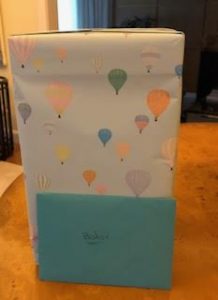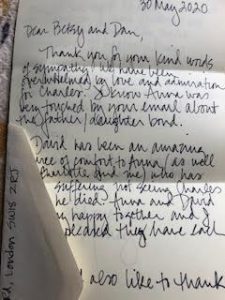
I am a relic of a by-gone era. I believe handwritten thank you notes should still be written in response to gifts (except from immediate family members, when a verbal thank you will suffice). As you see, I still have monogrammed stationery (the Featured photo) for writing such notes (as well as condolence notes). It is true, email may get there more quickly, but just doesn’t have the same impact.
I insisted that both my children send “thank you’s” for every gift they received when they were bar mitzvahed (admittedly, a long time ago). That was challenging for my younger child, as he hated to write and barely attended school that year. We worked out a system. I had a list of every gift and addressed every envelope. I wrote a template for a short note, commenting whether the person had attended the ceremony or not (“glad you were able to join me on my special day”, or ” sorry you couldn’t…”), then thanking for the specific gift, which was on a spreadsheet and would be checked off once the note was written. Then a signature. Just that simple, but at least there was a personal touch. We wrote about five a day and got through all of them.
My birthday was not too long ago. I have exchanged presents with a childhood friend for 45 years. Her birthday is one month earlier than mine. She writes a note immediately and her gift arrived weeks before my birthday and sat, waiting for my big day. It was a beautiful decanter, which now sits on my dining room chest. I wrote my thank you note immediately, though was too late to get it in the mail that day. We’ve exchanged jewelry, scarves, books; we know each other well. But I wouldn’t think of just texting or emailing. We just don’t do that with each other.
Last May, David’s long-time girlfriend lost her father. We sent flowers to her mother in London and I wrote a long condolence note to her. Worried, that it might take too long to get through international mail, I also sent it via email, a few days after I sent my handwritten note. I received a lovely note from her mother some weeks later. Perhaps it is just our generation, but I do believe that the handwritten note is the correct way to acknowledge gifts, contributions or condolences of any sort.
Having said all that, it can be difficult to actually say “thank you” to someone in real time. Showing gratitude in a way that the other person receives it can be challenging. How to say it in a meaningful way without being heavy-handed, or too dismissive, or too flowery is a delicate task. I know I sometimes struggle with it. I can be too off-handed; “Thanks”, just isn’t the right tone. “No problem”, “Sure”, etc. It can be difficult to strike the right balance, not hurt the other person’s feelings, particularly when the person is giving a thoughtful gift and wants to be properly thanked. We all do, right? So we have to get the tone and level of enthusiasm just right so we don’t hurt any feelings. We have to take the other person into account.
And I have given up trying to get my children to write thank you notes at this point in their lives. Now an email, text of phone call to a relative will do just fine, thank you very much!
Retired from software sales long ago, two grown children. Theater major in college. Singer still, arts lover, involved in art museums locally (Greater Boston area). Originally from Detroit area.





As I’ve noted in response to your comment on my story, Betsy, I already knew that you, too, were thoroughly “old school” about writing thank you letters — not just email mesages. Indeed, you also use your own stationary as the featured image to your story. Great minds, huh? But, as always, you also have several other terrific pictures to enhance your story.
But I appreciate what you have to say here beyond that. As you note in your penultimate paragraph, it is not just the writing of the thank you note per se that is important. One also has to get the tone just right, which can often be difficult. As you wisely conclude, “We have to take the other person into account.”
In short, thank you for this superb, thoughtful story. (But should I also be sending you a letter to this effect?)
No thank you note required here, John. Your comment is all that is called for, but thank you for that!
I have to admit it’s intimidating–no, actually, staggering–to hear of someone actually even thinking of getting their personalized thank-you into the mail the VERY SAME DAY you opened a gift! But it’s good to know there are those who set the targets that high, as I go about hoping to have my thank-you’s received at a lower rung of the Ultimate Gratitude scale.
P.S. You really sound like a great teacher/special educator when you set up the template for writing a thank-you note after the bar mitzvah. I actually used some similar techniques with papers in some of my college classes–and even occasionally graduate classes. And I always apologized if anyone thought I was patronizing them by offering these kinds of supports–and all I got back was, no, it’s not patronizing, please keep doing that!
Thank you, Dale. I find that if I don’t write the note immediately and put it off, it is too easily forgotten. That friend sets the bar high and I try to respond in kind. It keeps the friendship fresh. We might have exchanged presents for 46 years, but we’ve been friends since the age of 12, though we didn’t live in the same city. We attended the same camp and college. At two points in our lives we did live geographically close, but haven’t in a long while.
As for the thank-you note support, thanks for your kind comment. I found it helped the process a great deal and saved headaches for both of us. It gave my child a much-needed structure. Kids on the autism spectrum need structure!
The photo of your monogrammed stationery really took me back. My grandmother worked in the custom stationery department of a high-end department store. She sat in an elegant little alcove surrounded by Crane’s stationery, Cross pens, and album after album of samples. It really did make an impression on me…I still love beautiful stationery and writing implements, and of course handwritten thank-you notes! Almost a lost art, but not quite thanks to people like you.
I remember those albums well, Barb. When I run out of this stationery (which isn’t lined, as you might have noticed…I did save money on that point), I’m not sure what I’ll do. The nice stores that carried such items are all gone now. I think the personal note will be gone with our generation. I tend to do a rough draft before writing the actual note, so I don’t make mistakes in ink, as there are no edits. When the birthday present friend’s father passed away, three years ago, it was the day we packed up the Vineyard for the season. I sent an email immediately, promising a longer note as soon as I got home. I thought about it before writing, as it had to be meaningful. It was too long for my note paper, so just on white paper. For a person who DOES write thank you notes, she sent an email immediately, telling me how touched she was by my letter, how much it meant to her and that she would share it with her mother, long divorced from her famous dad. Somehow, sending my letter by email just wouldn’t have been the same.
Betsy, your story struck so many familiar chords. I also hovered over my three kids to write those thanks you notes for their Bar/Bat Mitzvahs. They were pretty good about wedding gifts, but with my grandkids, I’m happy to receive an email or a text. What you wrote about finding the right way to express gratitude is so true.
Yes, Laurie, with the next generation, I think we will be lucky to get a text or email. No one writes any longer. And those verbal “thank you’s” can be very tricky. One must get it correct or risk hurt feelings, which is exactly the opposite of what’s intended.
Betsy, what a fantastic idea to send the condolence messages by “real” notes and email. I’ve always felt that email wasn’t exactly right, but wanted to be timely. This will work with other messages as well. I love the stationery departments in those fancy stores and I’m sure they are gone by now. How sad.
I did it that way due to the length of time international mail would take, but that way, Anna would get the message more quickly, but still eventually have the note to hold on to. (I just lit my father’s yahrzeit candle – 31 years and I still have every condolence that was written; there are a few that I return to. One became the model that taught me how to write a meaningful one.)
I’m sure you are correct that the stationery departments are a thing of the past, Marian.
Wonderful story, Betsy! I admire you for holding on to the old ways that we were all brought up to follow. And I love your elegant monogrammed stationery. I always made my kids write thank-you notes for birthday presents and bar/bat mitzvah gifts, but I suspect they haven’t done it since they were 13. Oh well, no one in their generation does.
Thank you, Suzy. I agree, our ways will soon be gone. The younger generation doesn’t even have pen and paper to write with and says, “What’s a stamp?”
Alas, we are old school — I, too, miss a handwritten note, and still send them.
Thank you, comrade in writing!
No problem!🤪
LOL!
Ah Betsy, I well remember the battle getting my son to write his thank-you notes after his bar mitzvah! I hope he now at least sends text or email thank you notes, I’m sure he doesn’t write them!
And as I’ve confessed to John, I often forgo snail mail for email myself, may my mother forgive me!
I understand that email has increasingly become the way to say “thank you”. It is the wave of the future.
Yes email is, you can’t fight it and the truth is I like it. I’ve reconnected with old friends and stayed in closer touch with far flung family since the advent of FB and email.
But I still like to handwrite birthday and holiday cards and mail them the old fashioned way!
I agree, Dana. Email is a great way to stay in touch. The only time I write a real note is for something special like thanking for a gift or sending condolences; something more formal. And phone calls are still good, too!
You touched a nerve in me mentioning your tendency to be (or at least sound) too casual when the situation calls for something else. I have a real problem saying things that sound like I am minimizing someone else’s problem or complaint, when I am not. I try to defuse or remedy bad feelings and sadness through humor, which can backfire.
A delicate situation, no doubt, Dave. The proper reply requires great tact, particularly when responding in “real time” and we are not perfect creatures.